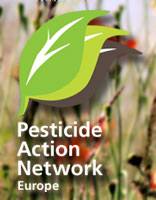06 September 2006, Bologna
NGOs demand stronger public and private commitment to the reduction of pesticide use in Europe
Tomorrow, dozens of Non-Governmental Organisation (NGO) representatives from all regions in Europe will gather in a conference to demand national Governments, European Institutions and private companies a stronger commitment towards the reduction of pesticide use in Europe. Despite tighter regulatory controls compared to other parts of the world, pesticides consumption in Europe is increasing and thousands of farmers, their families and neighbours are irreversibly affected by pesticides every year in the Europe.
While organic production has a common framework and special lines of support in most European countries, Integrated Crop and Pest Management is a viable technique to effectively reduce pesticide use and risks but still has no common European framework. Plus governments' initiatives to curb pesticide use vary enormously in Europe. Some countries like Switzerland or Germany have national guidelines for Integrated Crop and Pest Management and actively promote it at the national level, other countries have national pesticide reduction programmes (Denmark, Sweden and Norway) while others are lagging behind and have experienced 100% pesticide use increase in the last 10 years (e.g. Portugal). In non-EU countries from the Balkans and New Independent States, the situation is even more critical. Most countries don't have reliable data on pesticide consumption and alternatives to pesticide use in crop protection are not sufficiently promoted and supported. Consumers' awareness and knowledge about the dangers posed by pesticides is in general lower and problems such as obsolete stockpiles are acute and still left unsolved.
To address these discrepancies, the European Commission just launched a Directive for the Sustainable Use of Pesticides that seeks to reduce risks and dependence of pesticides. But while the new Directive does introduce some positive measures for Member States that still don't have a national action plan addressing pesticides and very little public awareness on the hazards posed by pesticides (Southern European countries and some new Member States), it fails to introduce strong measures to curb pesticide use and break the unsustainable link between agricultural productivity and pesticides use. Growing consumer awareness regarding the hazards posed by pesticides is also pushing many retailers, supermarkets and citizens organisations to start their own programmes and campaigns for the reduction of pesticides. This is the case of Legambiente, who started its own self-certification scheme for several products of vegetable and animal origin or AIAB- Associazione Italiana per l'Agricoltura Biologica, which is supplying quality organic products directly to demanding consumers in Italy.
This is the background for an intensive two-days' conference, where participants from 20 different European countries will be discussing concrete measures and recommendations for the promotion of pesticide use reduction, in particular Integrated Crop and Pest Management and organic production in Europe. The third day of the event will be dedicated to a field visit where participants will have the chance to visit an APOFRUIT cooperative and farm engaged in the production of certified Integrated Crop and Pest Management and organic fruit production.
The Pesticide Action Network Europe Annual Network Conference is organised in cooperation with SANA, Legambiente and AIAB and will be held in SANA Fair 7-9 September 2006 in Bologna. For more information please visit the website
http://www.pan-europe.info
— ENDS —
< Back


